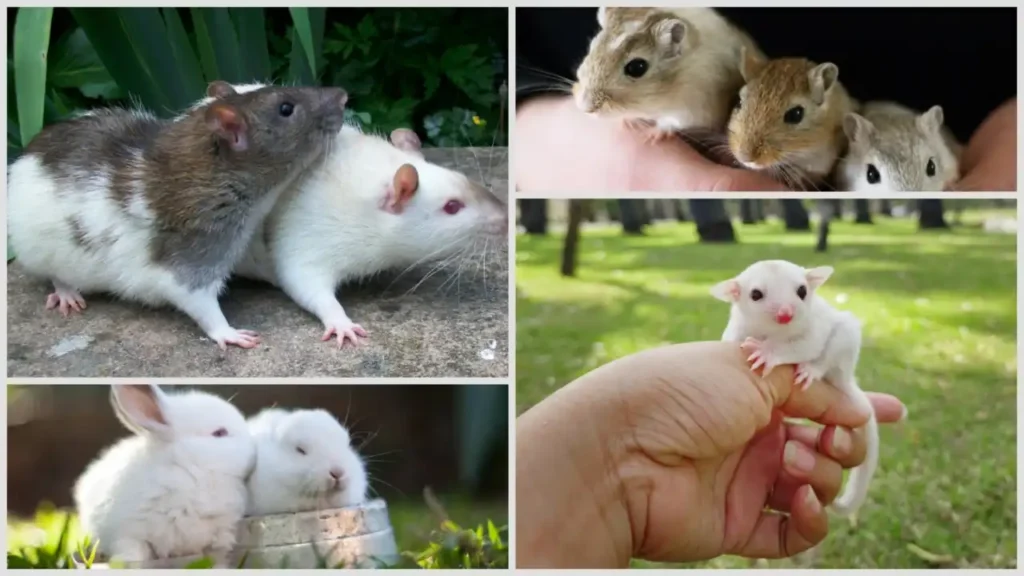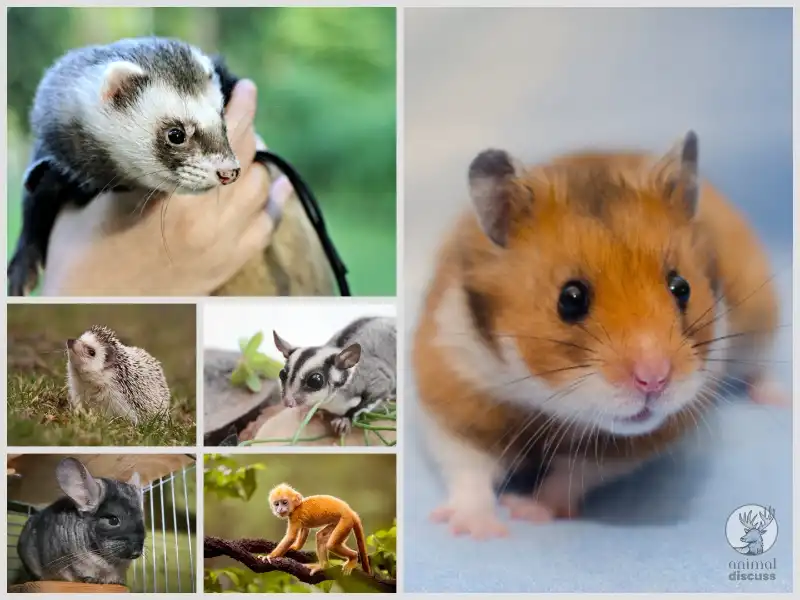Pet Mammals
Find out the types of pet mammals you can adopt, and understand their needs to ensure their health and legal compliance.

(Kawkab Nadim)
(Engineer and Pets Owner)
I have a passion for animals and love taking care of pets. That’s why I also operate several blogs about pet and animal husbandry.
Curious about keeping pet mammals? They are the best for keeping as pets, though not all mammals are suitable to keep.
A mammal refers to any individual of the class Mammalia of vertebrate animals. Their offspring are fed milk from the mother’s unique mammary glands.

And mammals make excellent pets because they provide their owners with understanding, friendship, and an unbreakable link of affection.
Now, let’s explore the world of mammals to discover the boundless joy they bring into your life!
What Types of Animals Are Called Mammals?
As you are aware, mammals form a category of vertebrate animals, certain mammalian classes typically exhibit lower hair coverage than others. Thus, mammals with hair or fur may withstand the cold by keeping their bodies warm.
Humans, cats, dogs, rats, deer, bears, monkeys, apes, bats, whales, dolphins, tigers, lions, etc. are examples of mammals. When compared to other animal species, their brains are more fully developed.
What Types of Mammals Can Be Kept as Pets?
I have made a table with additional information on the types of mammals that can be kept as pets and their categories.
| Type of Mammal | Category |
|---|---|
| Rats | Rodents |
| Hamsters | Rodents |
| Mice | Rodents |
| Guinea Pigs | Rodents |
| Gerbils | Rodents |
| Hedgehogs | Insectivores |
| Rabbits | Lagomorphs |
| Sugar Gliders | Marsupials |
| Dogs | Canids |
| Ferrets | Mustelids |
| Chinchillas | Rodents |
| Cats | Felines |
Interested in learning more about pets animal? Read our article covering important details about different types of pets, including their care, nutrition and more!
However, pet species differ from one another in terms of life duration, grooming requirements, interactions, and other factors. In that sense, you need to understand which mammals are best to keep as pets.
What Are the Best Mammal Pets for Your Home?
You must conduct thorough research to identify the ideal pet for your household and way of life. And I believe after reading this, you can decide on that easily. Let’s see which tiny mammal would suit you best for your home and family.
Rabbits
For those desiring a social companion without the commitment of regular walks, owning a rabbit is ideal. They can be easily trained to use a litter box, offering a cat-like convenience.
Guinea Pigs
Mainly guinea pigs can thrive both indoors and outdoors with sufficient space and proper temperature regulation during extreme weather. They may be accommodated in spaces like a shed, a car-free garage, or a heated outhouse.
Hamsters
Generally, hamsters, unlike dogs and cats, require minimal maintenance. They thrive on fresh fruit, veggies, hay, and suitable hamster pellets. Instead of extensive training like dogs, they only need regular petting, snuggling, and socialization!

Other animals like cats, dogs, and rats can be great pets for your home and family which are easy to take care of.
What Types of Food You Should and Should Not Feed to Your Pets?
There are various formats of pet foods for mammals. It is crucial to remember that your pet food’s superiority should be determined by its substance rather than its appearance.
I have made a table containing foods with nutrition that you can give your pets.
| Nutrition | Foods |
|---|---|
| Protein | Meats, vegetables and soy |
| Carbohydrates | Oats, barley, soy |
| Fats and Oils | Fish oil, olive oil, cod liver oil, flaxseed oil, hemp oil, etc. |
These foods contain proper nutrition, minerals and vitamins which are tested for mammal pets. But I recommend these foods to feed your pets specific doses every day.
However, you should be aware of the food which should be avoided.
- Excessive fats
- Avocados
- Corn
- Butter
- Coffee
- Chocolate
- Caffeine
- Artificial dyes and colors
- Glutens
- Extreme carbohydrates
- Grapes, etc.
How To Take Care of Your Pet Mammals?
Let’s examine the fundamentals that every devoted pet owner needs to know in order to make sure their pet’s well-being is in good condition.
- Give Them Nourishing and Healthy Food: Mammal pets require specific food formulated to meet their unique nutritional needs. Moreover, consult a veterinarian if you are uncertain about your pet’s dietary needs.
- Provide Them with A Comfortable and Secure Home: Keep them indoors for safety. Protect them from extreme weather conditions and predators like coyotes.
- Ensure Your Pets Remain Active: Proper socialization techniques can help your pet thrive. Hence, playtime is essential for pet owners to ensure their pets’ emotional and physical health.
- Veterinary Care Involves Visits: Pet owners must schedule regular vet visits for their animals, especially cats, to ensure their health and well-being.
What Are the Common Diseases Your Pet Mammals May Carry?
Let’s discover the common diseases that your pet mammals may carry and how those spread.
Campylobacteriosis
Mainly campylobacteriosis is a disease caused by the bacteria campylobacter, which can infect humans and animals, particularly rodents like gerbils, guinea pigs, and hamsters.
Giardiasis
It is a parasite found in contaminated surfaces, food, water, and soil, infecting mice, rats, and chinchillas.
Leptospirosis
Mainly leptospirosis is a bacterial illness that affects humans and animals, with rodents being a common species. These bacteria proliferate through urine. Infected individuals can contract the disease by touching infected animals’ urine or contaminated materials.
Rat-bite Fever
Haverhill fever, also known as ‘Rat-bite fever’, is caused by Streptobacillus moniliformis and Spirillum minus bacteria. It spreads through bites, scratches, tainted food, water, and contact with rodent excrement, but cannot be passed from person to person.
So, if you are about to keep a mammal pet, you must be aware of these diseases and check them up when necessary.
Are There Any Legal Restrictions for Any Mammals?
Yes. There are some pets that have legal restrictions to be kept in certain places, such as hamsters, gerbils, hedgehogs, chinchillas, etc.

Let’s check out the table containing the mammals with legal restrictions.
| Types of mammals | Legal Restrictions |
|---|---|
| Monkeys | Illegal in 19 states including California, Colorado, New York, etc. In Hawaii, anyone needs permission. |
| Hamsters | Not allowed in Hawaii, not permitted to keep Chinese Hamsters in California. |
| Sugar Gliders | Illegal in Hawaii, California, and Alaska. |
| Ferrets | Banned in Hawaii and the Golden State. |
| Hedgehogs | Illegal in California, Hawaii, Georgia, Pennsylvania, and New York City. Must obtain specific permits in several other states. |
| Gerbils | Not permitted in Hawaii and California. |
| Chinchillas | Need permission in some states. |
So, before having a pet, you must think about the legal restrictions as well as the place you live.
Finally, consider tiny rats or other species that suit your lifestyle when choosing a pet mammal. Follow my article to know about their diet and avoid unhealthy items before keeping them as pets.
For prompt treatment, it is essential to identify prevalent disorders, such as respiratory conditions. To guarantee compliance, keep up with any legal limits on exotic pets. You may create a safe and loving environment for your variety of furry pets by practicing responsible ownership.
References
- https://www.cdc.gov/healthypets/pets/small-mammals/index.html
- https://www.britannica.com/animal/pet
- https://be.chewy.com/7-best-small-animal-pets-for-children/
- https://www.ukpetfood.org/resource/different-pet-food-formats.html
- https://www.britannica.com/animal/mammal
- https://dontforgetthepets.org/small-mammals/
- https://manoa.hawaii.edu/exploringourfluidearth/biological/mammals/what-mammal

